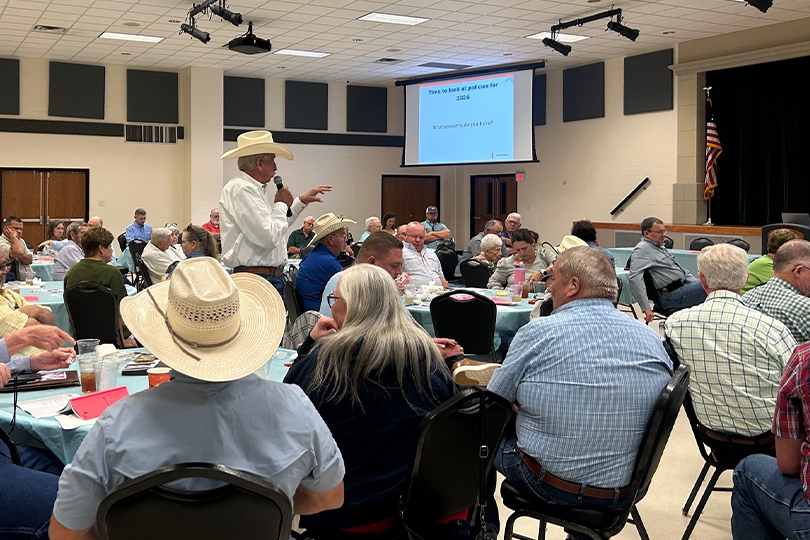By Julie Tomascik
Editor
Water, the New World screwworm, emissions standards and crop protection tools were among the topics discussed at Texas Farm Bureau (TFB) policy development meetings across the state this fall.
These meetings are an essential step in shaping the organization’s road map for the upcoming year, giving members an opportunity to surface concerns and discuss potential policy changes.
“Our grassroots strength comes from our members, who bring forward the ideas and concerns that guide Farm Bureau policy,” said Brant Wilbourn, TFB associate director of Commodity and Regulatory Activities. “These policy development meetings give us the foundation for decisions at the state and national levels. Every region may face different challenges, but the conversations reflect issues that impact agriculture and rural communities across Texas.”
About 630 county leaders representing nearly 160 counties attended the district meetings.
The state’s water crisis was a consistent issue raised by members. Landowners expressed concerns that extreme population growth, combined with years of severe drought, is putting pressure on the state’s water resources.
“Farmers and ranchers are the most vulnerable to drought and water supply disruptions,” Wilbourn said. “Discussion centered around the importance of local control and the movement of groundwater to an outside urban area.”
That discussion comes as Texans prepare to vote this fall on a constitutional amendment to establish a state water fund. The decision could shape the future of Texas water management.
Another pressing issue was the New World screwworm, a growing threat that continues to move closer to the U.S.-Mexico border. Members noted the work Farm Bureau has already done on this threat but emphasized that additional education and planning are still needed.
“Farm Bureau has been engaged on this issue for some time, and our members recognize that,” Wilbourn said. “But there’s still work ahead on education, animal health planning, agency response and even exploring an industry-wide assessment program to respond to the pest.”
Crop protection tools also were discussed as the Make America Healthy Again movement gains momentum. Farmers and ranchers stressed that regulatory decisions should be guided by science, not politics.
“Members discussed the need for sound science to be used when making decisions about crop protection tools and other regulations that impact farmers’ ability to grow food and raise livestock,” Wilbourn said.
Other topics included strengthening crop insurance and removing mandatory emissions systems on farm equipment.
The next step in the process requires county Farm Bureaus to submit adopted policy resolutions from their annual meetings to the state office by Oct. 24. Those resolutions will then be considered by the TFB Resolutions Committee in November.
The committee’s recommendations will move forward to the TFB Annual Meeting in December, where voting delegates will make the final decisions that shape Texas Farm Bureau’s state and national policy positions for the year ahead.


Leave A Comment